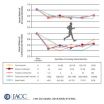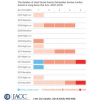(Press-News.org) PITTSBURGH, July 28, 2014 -- People with dementia are more likely to get implanted pacemakers for heart rhythm irregularities, such as atrial fibrillation, than people who don't have cognitive difficulties, according to researchers at the University of Pittsburgh School of Medicine. In a research letter published online today in JAMA Internal Medicine, the researchers noted the finding runs counter to expectations that less aggressive interventions are the norm for patients with the incurable and disabling illness.
To look at the relationships between cognitive status and implantation of a pacemaker, lead investigator Nicole Fowler, Ph.D., a health services researcher formerly at the Pitt School of Medicine, and her team examined data from 33 Alzheimer Disease Centers (ADCs) entered between September 2005 and December 2011 into the National Alzheimer's Coordinating Center (NACC) Uniform Data Set.
Data from more than 16,000 people who had a baseline and at least one follow-up visit at an ADC were reviewed. At baseline, 48.5 percent of participants had no cognitive impairment, 21.3 percent had a mild cognitive impairment (MCI), and 32.9 percent had dementia.
The researchers found that participants with cognitive impairment were significantly older and more likely to be male, have ischemic heart disease, and a history of stroke. Rates of atrial fibrillation and congestive heart failure were similar among the groups.
The likelihood of getting a pacemaker, a device that regulates the heart beat, was lowest for those who had no cognitive difficulties and highest for dementia patients.
"Participants who had dementia before assessment for a new pacemaker were 1.6 times more likely to receive a pacemaker compared to participants without cognitive impairment, even after clinical factors were taken into account," said Dr. Fowler, now at Indiana University. "This was a bit surprising because aggressive interventions might not be appropriate for this population, whose lives are limited by a severely disabling disease. Future research should explore how doctors, patients and families come to make the decision to get a pacemaker."
There was no difference among the groups in the rates of implantation of cardioverter defibrillators, which deliver a small shock to get the heart to start beating again if it suddenly stops.
INFORMATION:
Co-authors of the paper include Jie Li, M.S., Charity G. Moore, Ph.D., Samir Saba, M.D., Oscar L. Lopez, M.D., and Amber E. Barnato, M.D., M.P.H., M.S., all of the University of Pittsburgh, and Kim G. Johnson, M.D., of Duke University Medical Center.
The project was funded by the Agency for Healthcare Research and Quality and National Institutes of Health, National Institute on Aging grant AG05133. The NACC database is funded by National Institutes of Health, National Institute on Aging grant AG016976.
About the University of Pittsburgh School of Medicine
As one of the nation's leading academic centers for biomedical research, the University of Pittsburgh School of Medicine integrates advanced technology with basic science across a broad range of disciplines in a continuous quest to harness the power of new knowledge and improve the human condition. Driven mainly by the School of Medicine and its affiliates, Pitt has ranked among the top 10 recipients of funding from the National Institutes of Health since 1998. In rankings recently released by the National Science Foundation, Pitt ranked fifth among all American universities in total federal science and engineering research and development support.
Likewise, the School of Medicine is equally committed to advancing the quality and strength of its medical and graduate education programs, for which it is recognized as an innovative leader, and to training highly skilled, compassionate clinicians and creative scientists well-equipped to engage in world-class research. The School of Medicine is the academic partner of UPMC, which has collaborated with the University to raise the standard of medical excellence in Pittsburgh and to position health care as a driving force behind the region's economy. For more information about the School of Medicine, see http://www.medschool.pitt.edu.
http://www.upmc.com/media
Dementia patients more likely to get implanted pacemakers, says Pitt study
2014-07-28
ELSE PRESS RELEASES FROM THIS DATE:
Non-endoscopic migraine surgery provides significant symptom relief
2014-07-28
A revised version of a surgical procedure to treat severe chronic migraine headaches led to significant symptom relief more than 90 percent of the time in patients treated at Massachusetts General Hospital (MGH). Physicians from the MGH Division of Plastic and Reconstructive Surgery report that more than half of 35 patients treated with the non-endoscopic procedure – all of whom had headaches associated with compression of craniofacial nerves – reported complete symptom relief a year later. The team's paper has received advance online publication in the journal Plastic ...
Gender disparities in cognition will not diminish
2014-07-28
The study, published in the Proceedings of the National Academy of Science, investigated the extent to which improvements in living conditions and educational opportunities over a person's life affect cognitive abilities and their implications for men and women.
"Our results show that there is no reason to expect all cognitive gender differences will diminish," says Daniela Weber, IIASA researcher and lead author of the study. "However, the findings from this study suggest that if women and men had equal levels of education, then we should expect a female advantage in ...
Running reduces risk of death regardless of duration, speed
2014-07-28
Running for only a few minutes a day or at slow speeds may significantly reduce a person's risk of death from cardiovascular disease compared to someone who does not run, according to a study published today in the Journal of the American College of Cardiology.
Exercise is well-established as way to prevent heart disease and it is component of an overall healthy life, but it is unclear whether there are health benefits below the level of 75 minutes per week of vigorous-intensity activity, such as running, recommended by the U.S. government and World Health Organization.
Researchers ...
Endurance runners more likely to die of heat stroke than heart condition
2014-07-28
Heat stroke is 10 times more likely than cardiac events to be life-threatening for runners during endurance races in warm climates, according to a study published today in the Journal of the American College of Cardiology. The authors noted the findings may play a role in the ongoing debate over pre-participation ECG screenings for preventing sudden death in athletes by offering a new perspective on the greatest health risk for runners.
Two of the most recognized causes of sudden death during an endurance race are arrhythmic death, sudden death usually caused by undetected ...
Learning the smell of fear: Mothers teach babies their own fears via odor, research finds
2014-07-28
ANN ARBOR, Mich. — Babies can learn what to fear in the first days of life just by smelling the odor of their distressed mothers, new research suggests. And not just "natural" fears: If a mother experienced something before pregnancy that made her fear something specific, her baby will quickly learn to fear it too -- through the odor she gives off when she feels fear.
In the first direct observation of this kind of fear transmission, a team of University of Michigan Medical School and New York University studied mother rats who had learned to fear the smell of peppermint ...
New study confirms water vapor as global warming amplifier
2014-07-28
MIAMI – A new study from scientists at the University of Miami Rosenstiel School of Marine and Atmospheric Science and colleagues confirms rising levels of water vapor in the upper troposphere – a key amplifier of global warming – will intensify climate change impacts over the next decades. The new study is the first to show that increased water vapor concentrations in the atmosphere are a direct result of human activities.
"The study is the first to confirm that human activities have increased water vapor in the upper troposphere," said Brian Soden, professor of atmospheric ...
Impact of Deepwater Horizon oil spill on coral is deeper and broader than predicted
2014-07-28
A new discovery of two additional coral communities showing signs of damage from the Deepwater Horizon oil spill expands the impact footprint of the 2010 spill in the Gulf of Mexico. The discovery was made by a team led by Charles Fisher, professor of biology at Penn State University. A paper describing this work and additional impacts of human activity on corals in the Gulf of Mexico will be published during the last week of July 2014 in the online Early Edition of the journal Proceedings of the National Academy of Sciences.
"The footprint of the impact of the spill ...
The bit of your brain that signals how bad things could be
2014-07-28
An evolutionarily ancient and tiny part of the brain tracks expectations about nasty events, finds new UCL research.
The study, published in Proceedings of the National Academy of Sciences, demonstrates for the first time that the human habenula, half the size of a pea, tracks predictions about negative events, like painful electric shocks, suggesting a role in learning from bad experiences.
Brain scans from 23 healthy volunteers showed that the habenula activates in response to pictures associated with painful electric shocks, with the opposite occurring for pictures ...
Cell's recycling center implicated in division decisions
2014-07-28
Most cells do not divide unless there is enough oxygen present to support their offspring, but certain cancer cells and other cell types circumvent this rule. Researchers at The Johns Hopkins University have now identified a mechanism that overrides the cells' warning signals, enabling cancers to continue to divide even without a robust blood supply. In the process, the researchers found that lysosomes — the cell's protein "recycling centers" — help govern cell division decisions. They also uncovered new evidence that certain drugs can halt the growth of tumors that have ...
Facial features are the key to first impressions
2014-07-28
A new study by researchers in the Department of Psychology at the University of York shows that it is possible to accurately predict first impressions using measurements of physical features in everyday images of faces, such as those found on social media.
When we look at a picture of a face we rapidly form judgements about a person's character, for example whether they are friendly, trustworthy or competent. Even though it is not clear how accurate they are, these first impressions can influence our subsequent behaviour (for example, judgements of competence based on ...



